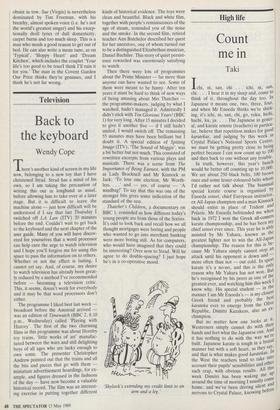Television
Back to the keyboard
Wendy Cope
There's another kind of screen in my life now, belonging to a new toy that I have christened Strad. Strad has a mind of his own, so I am taking the precaution of writing this out in longhand as usual, before allowing him to take over at a later stage. But it is difficult to leave the machine alone — just how difficult will be understood if I say that last Thursday I switched off LA Law (ITV) 20 minutes before the end. Couldn't wait to get back to the keyboard and the next chapter of the user guide. Many of you will have discov- ered for yourselves that a word processor can help cure the urge to watch television and I hope you'll forgive me for using this space to pass the information on to others. Whether or not the effect is lasting, I cannot yet say. And, of course, my desire to watch television has already been great- ly reduced by a method I've recommended before — becoming a television critic. This, it seems, doesn't work for everybody and it may be that word processors don't either.
The programme I liked best last week broadcast before the Amstrad arrived was an edition of Timewatch (BBC 2, 8.10 p.m., Wednesday) called 'Playing with History'. The first of the two charming films in this programme was about Hornby toy trains, 'little works of art' manufac- tured between the wars and still delighting boys of all ages who are lucky enough to own some. The presenter Christopher Andrew pointed out that the trains and all the bits and pieces that go with them miniature advertisement hoardings, for ex- ample, and figures dressed in the fashions of the day — have now become a valuable historical record. The film was an interest- ing exercise in putting together different kinds of historical evidence. The toys were clean and beautiful. Black and white film, together with people's reminiscences of the age of steam, reminded you of the noise and the smoke. In the second film, retired teacher Ann Batchelor described her quest for her ancestors, one of whom turned out to be a distinguished Elizabethan musician, Daniel Bachiler. Thisstory of quiet persist- ence rewarded was enormously satisfying to watch.
Then there were lots of programmes about the Prime Minister — far more than anyone can have wanted to see. Some of them were meant to be funny. After ten years it must be hard to think of new ways of being amusing about Mrs Thatcher the programme-makers, judging by what I watched, hadn't managed it. Admittedly I didn't stick with Ten Glorious Years! (BBC 1) for very long. After 15 minutes I decided to give it another five — if I still hadn't smiled, I would switch off. The remaining 55 minutes may have been brilliant but I doubt it. A special edition of Spitting Image (ITV), 'The Sound of Maggie', was a bit better but not much. This consisted of rewritten excerpts from various plays and musicals. There was a scene from The Importance of Being Earnest, with the PM as Lady Bracknell and Mr Kinnock as Jack: 'To lose one election, Mr Worth- less. . . .' and — yes, of course — 'A windbag!' To say that this was one of the stronger bits gives some indication of the standard of the rest.
Thatcher's Children, a documentary on BBC 1, reminded us how different today's young people are from those of the Sixties. It's odd to look back and recall how we all thought mortgages were boring and people who wanted to go into merchant banking were more boring still. As for computers, who would have imagined that they could be interesting? Over now to Strad. Will he agree to do double-spacing? I just hope he's in a co-operative mood.
'Shylock's extending my credit limit to an arm and a leg.'


























































 Previous page
Previous page